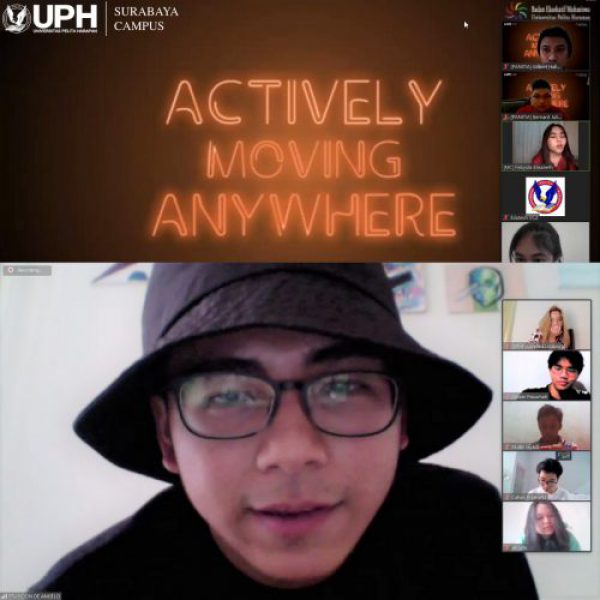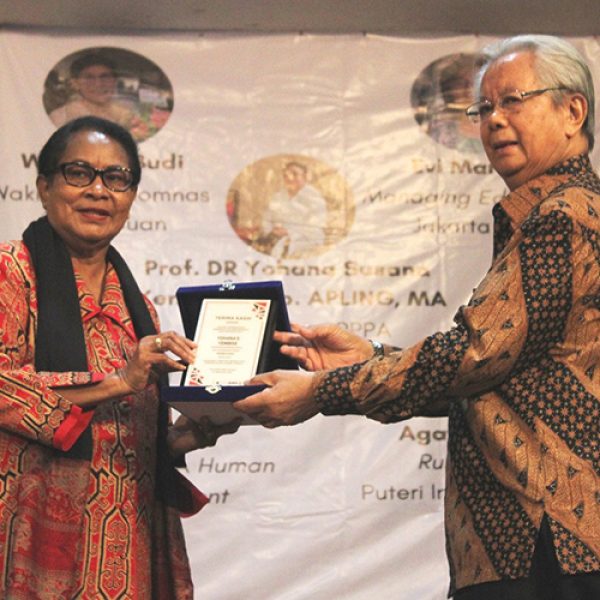2019
UPH ‘Earth Week’ Appreciated by the Ministry of Environment and Forestry.

Earth Week, held by Service Learning Community (SLC) Universitas Pelita Harapan (UPH), is commended by the Ministry of Environment and Forestry (KLHK). The Ministry is represented by Dr. Ir. Ruandha Agung Sugardiman, M.Sc., the General Director of the KLHK Coordinator of Climate Change, who is present in the Movie Discussion: ‘Before the Flood’, held on March 28, 2019, at MYC MPR, UPH Lippo Village Campus. “Before the Flood” is a documentary depicting climate change and extreme weather in countries across the world, as a result of damaging human activities.
“After seeing a number of environment-awareness events, we found out that this event is one that really touches the lifestyle of students. This means that the issues talked about can be understood better, and the students can understand why it is very important to take care of the environment,” Dr. Ruandha testified of the event.
After viewing some clips from ‘Before the Flood’, Dr. Ruandha also explained the condition of our environment and forests in Indonesia, as well as the mitigation and adaptation efforts done by the government. These have been documented in the Indonesia NDC (Nationally Determined Contribution), a document specifying Indonesia’s commitment to reduce the international greenhouse effect emission by 26%.
“Indonesia is the biggest archipelago in the world, with tropical rainforests rich with energy and minerals. However, these advantages are also the factors that make it prone to natural disasters. Coupled with extreme climate changes, the effects are even worse. The NDC (Nationally Determined Contribution) therefore specifies the transition Indonesia will take to become a country with low emission and more immune to extreme climate changes,” Ditjen Ruandha explained.
Dr. Ruadha broke down the main agenda of NDC Forestry: limiting deforestation (<450.000 – 325.000 hectares per year by 2030), improving the sustainable forest management principle of Natural Production Forests (reduction of forest degradation) and Industrial Forests, the rehabilitation of degraded land (12 million hectares, or 800.000 hectares per year by 2030), with a success rate of 90% and a peat restoration (2 million hectares by 2030), with a success rate of 90%.
Dr. Ruandha discloed the efforts taken to reduce natural disaster risks. They include infrastructure-related solutions as well as an awareness-building agenda among the society. The government has educated people on how to manage household waste and has switched to using gas or electrical fuel for public transport. However, he admitted that his agenda does not always work without obstacles along the way.
The issues that arise most often are how the regulations can be implemented in every sector of the ministry. KLHK has emphasized that these regulations should also be put into effect in the province, city, and district levels. The government has to make a program that involves all people to fight for emission reduction.
In addition to the KLHK, Prof. Dr. Herry Purnomo, M.Comp, an Academia and Researcher from the Center for International Forestry Research (CIFOR), was also present, and in the event, he urged students to take part in the betterment of their environment.
“Students can change their lifestyle in simple ways. For example, if traveling in short distances, you can bike or walk, instead of using your motorcycle or car. A simple change such as this can be a significant change for the community if we all do it together. Also, reduce your plastic use – take your own tumbler or shopping bag when going out,” Herry explained.
This event is hoped to inspire the 60 students and lecturers present to participate more actively in saving the environment. Dirjen Dr. Ruandha also gave suggestions on the role of KLHK.
“Every year, KLHK sends a negotiator to talk about climate change internationally. In the future, we might be able to invite, or look for, an UPH student to be a negotiator and put Indonesia in a more elegant position, especially from the perspective of international law. We can start searching from the Faculty of Law,” Ruandha said, ending his speech. (pl/mt)



